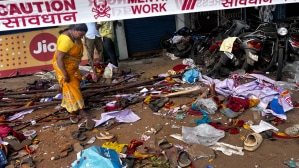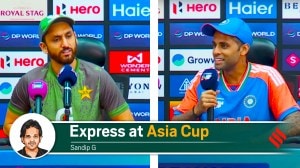NSCN pins truce on Greater Nagaland
The UPA government’s common minimum programme had its resonance far away in Amsterdam with NSCN(I-M) leaders seeking New Delhi’s c...

The UPA government’s common minimum programme had its resonance far away in Amsterdam with NSCN(I-M) leaders seeking New Delhi’s clarification on the reference to ‘‘maintaining the territorial integrity of the existing’’ North-East states in the document.
Sources said NSCN(I-M) leaders Isaac Chisi Swu and Thuingaleng Muivah confronted New Delhi’s special emissary, K. Padmanabhaiah, during the peace talks at Amsterdam on June 23-25 and told him that extension of the seven- year ceasefire (which expires on July 31) would be considered after he gets a clarification from the government on the CMP.
Padmanabhaiah was accompanied by Intelligence Bureau chief K.P. Singh and Joint Director (IB) Ajit Lal.
While the NSCN(I-M) is expected to extend the ceasefire for another year, Padmanabhaiah and the government are working hard on the clarification before the former gets back to the Naga leaders in Bangkok later this month.
Sources said both Swu and Muivah have told the emissary they would be forced to go back to the Naga people to decide on continuing the ceasefire as the CMP rules out their key demand of a Greater Nagaland incorporating Naga- dominated areas of Manipur and Assam.
It is not only the NSCN(I-M) that is having second thoughts on the ceasefire. A dominant section of the security establishment has recommended that peace talks be reviewed by the Cabinet Committee on Security (CCS) so that the government takes a clear cut line on the NSCN(I-M) demand and the clarification sought by the leaders.
The Home Ministry feels the NSCN(I-M) cadre have consolidated and expanded their reach during the ceasefire while other groups that have acted as a counterweight to the biggest insurgent group have shrunk in size and strength.
As New Delhi cannot be seen as giving in to the NSCN(I-M)’s demand for greater Nagaland due to its ramifications across the country, the Manmohan Singh government is exploring the option of creating autonomous tribal areas in Manipur. This would be in line with autonomous Hill Councils in lower Assam and Arunachal Pradesh.
Experts say though the NSCN(I-M) will extend the ceasefire as it stands to benefit, there could be problems later over the greater Nagaland demand. They say the CCS will have to first take a policy decision on the issue before the peace talks can go on to more substantive matters.
Padmanabhaiah and his team have been meeting the two leaders for the past seven years at a number of locations across the world but the Naga peace talks have been stuck on the basic NSCN(I-M) demand. Now, the Home Ministry is asking Padmanabhaiah to come out with a strategic paper that deals with the roadmap ahead.






- 01
- 02
- 03
- 04
- 05

























